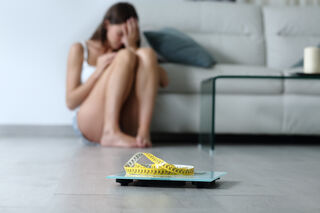Beauty
7 Ways to Stop Comparing Yourself to Damaging Beauty Ideals
Unrealistic beauty standards hurt our mental health. Liberate yourself.
Posted January 31, 2021
We all compare ourselves to others. It’s a default of human nature. We do this because sometimes it’s helpful since it provides us with a yardstick for measuring our progress towards goals. Let’s imagine you have a friend named Joe. Joe completed an MBA program and later went on to open his own accounting business. You might want a similar path to Joe’s, and so you often compare your progress to his and this gives you motivation to move forward.
But when is making social comparisons unhealthy?
Well, I think the answer to this depends on how you are using your powers of compare and contrast. I specifically think that social comparisons are damaging when they entail comparing yourself in terms of something you can’t control, as is largely the case with physical appearance.
So how can I stop comparing myself to my “perfect-looking” friends, you ask? The psychologist in me would love to elaborate on that. But before I do, I’d like to make a final point about comparisons—if every time you compare yourself to others, you feel terrible about yourself, or if you have a tendency to be overly critical of yourself in general, better to know this and aim towards few (if any) social comparisons. In the spirit of improving our body image and feeling better about ourselves, let’s talk about a few strategies that might help you break out of this sometimes helpful, but often painful habit.

- Steer your self-worth away from physical appearance: Society has perpetuated the belief that your appearance is first and foremost among your list of important qualities. Nothing could be further from the truth. The people who truly care about you care about much more than how you look. If you doubt this, try to think of the important people in your life and ask yourself, “What does this person value about me?” That said, if the answer to that is “my looks,” it might be time to rethink that relationship. You deserve better, period.
- Be the judge of what is beautiful. It is time to take the power back and define beauty how we see fit. We don’t have to conform to unrealistic beauty standards. Most of those beauty standards are impossible to achieve, and even if they weren’t, it would just be too much work. Use the energy you might want to spend on comparing yourself to those filtered images on social media for something that would make you feel good about yourself. Like, posting a picture of yourself with #nofilter, refraining from buying magazines with far-too-thin models pictured, going a day without makeup, etc. You pick, but pick well.
- Know how your brain works: We tend to believe what we see. It doesn’t matter if the information is false, we will believe it unless we have reason not to. The power of reasoning and critical thinking can be helpful here. It’s like watching a magic show—it looks interesting, looks real, but cognitively, you know it’s not. Why do you know this? Because we know how magic works and know that it’s an illusion. Use this power of critical thinking to your advantage. Go into social media, or wherever else false, damaging beliefs about beauty are perpetuated, and actively think about the “magic trick” behind them (aka photo filters and Photoshop).
- Limit the amount of time you spend on platforms that trigger your tendency to compare. If that’s social media, limit the amount of time you spend on it. If that’s too difficult, try to remove from your view images that lead to self-criticism. If you don’t see something, it can’t hurt you. If social media brings you grief, use your time in a more enjoyable way. Quitting social media altogether is hard. I know that social media is often the only mechanism we have to connect with people in our lives, but be wary of spending so much time on it that you begin to view everything you see or read there as reality. Social media is a place where most people try to portray their best selves—that includes their best pictures.
- Notice the pattern: Did you notice that you tend to compare yourself to others who you believe have your body ideal? Are the days when you compare yourself to those societally perpetuated beauty ideals worse than those when you focus on your amazing self? Are there specific websites or people who make you feel worse about yourself? Notice the pattern and make adjustments.
- Surround yourself with others who promote and live by body positivity. These individuals tend to be good sources of objectivity in the face of a world full of touched-up images. Having people in your life who promote this way of thinking can make you feel less alone in your attempts at combating societal pressures. They can also serve as a buffer for your self-esteem and remind you of your value.
- Practice using positive body talk: When you look in the mirror, try to look at your whole self, not just at the areas you dislike. While you are at it, try saying something positive about the way you look and appreciate all that your body does for you. Focusing on function rather than appearance does two things—it reminds you of what is inherently valuable about your body, and it distracts you from focusing on what you perceive to be physical flaws. Both of which are welcomed thoughts in my book.
There you have it. Try a few or all of these tips, and watch as your thought processes change and body appreciation settles in. You are beautiful inside and out. Embrace your true self.


